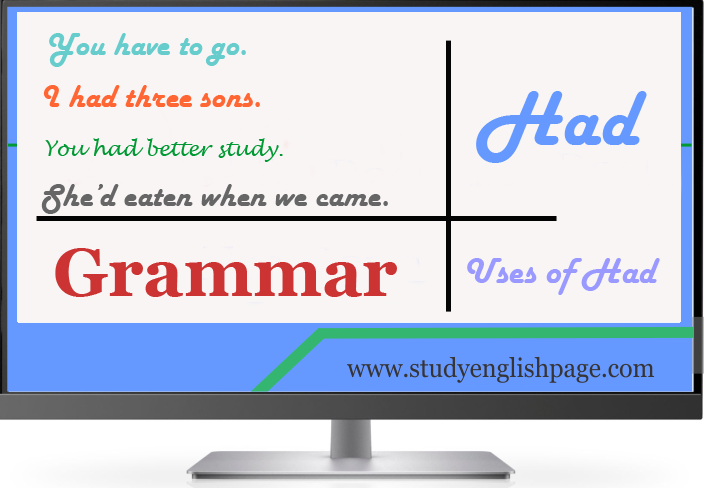Use of Had
You may have seen the word “had” in different places. You may have got confused. After reading this article, you will understand different uses of “had”.
Here are some examples. You had better read these examples before you dwell in details.
- I had three pens yesterday.
- They had better continue their work.
- I have had dinner with my friend so far.
- Lisa said that she had resigned from the job.
- I had received the appointment by the time you gave the offer.
- If she had invited me to the party, I would have attended the party.
Uses of Had
Had as an Auxiliary Verb
The word “had” is used as an
auxiliary verb to construct verb tense. We have different auxiliaries that we
use in constructing verb tenses and other structures. We use “had” as an auxiliary
verb in past perfect tense and past perfect progressive tense.
- They had left by the time she came.
- We had decided when you got informed.
- She had made tea before I ordered her.
- They had been waiting for two hours by the time I met them.
- John was called to the office because he had been wasting time since morning.
Remember that whenever we use past perfect tense, we use had as an auxiliary verb. The sentences of past perfect can be conditional sentences, reported speech, polite requests, or expressing regret.
- He said that he had eaten.
- They wished they had left earlier.
- If she had studied computer programming, she would have taken the project.
Had as a Verb of Possession
Had is the past form of “have”.
It means one of the uses of “had” is as a verb that is used in simple past
tense. We use “had” to show possession.
- Ali had an old car last year.
- I had three thousand dollars last month.
- They had more time to complete their project.
Had with Better
Had better is an alternative to
“should”. It means we use “had better” to give suggestions. Had better is
followed by a base form of the verb.
- He had better decide on time.
- You had better study abroad.
- They had better continue their studies.
Had as a Modal Auxiliary
Had + to is used as a modal
auxiliary in order to show past necessity or obligation. In this case, it is
the past form of “have to” or “must”.
- She had to accept the proposal.
- I had to study for the test, so I refused to go out with you.
- They had to complete the project on time because that was necessary for their goodwill.
Had as the Past Form of Have
Had is the past form of have.
As we know that we can use have as a possessive verb or causative verb. We use
had as the past form of have in simple past tense to show possession, or when one
person causes another to perform an activity.
Present Form
- I have many books.
- I have Ali write a letter.
Past Form
- I had many books when I was at the university.
- I had Ali write a letter.
- John’s mother had a car accident last year.
- I had a tough time when I was in the company.
Had as the Past Participle Form of the Verb
Had is also used as the past
participle form of the verb that we use in perfect tenses.
- I have had breakfast recently.
- She had had dinner by the time I met her.
Short Form of Had
Had can be written in short
form. This happens in two cases. When it is used as an auxiliary verb, we can
shorten it. Similarly, we can write it in short form when it is used in
combination with another word “better”. This use takes place generally in
informal and spoken English.
|
I had |
I’d |
We had |
We’d |
|
You had |
You’d |
He had |
He’d |
|
She had |
She’d |
It had |
It’d |
|
Ali had |
Ali’d |
She had
better |
She’d
better |
|
They had
better |
They’d
better |
You had
better |
You’d
better |
- She’d three sons when she divorced.
- I’d completed my homework by the time you called me.
- You’d better go by train because it is more comfortable.
Remember that the short forms of “had” can also be used for the word “would”. You can differentiate it by checking if there is a third form of the verb or the word “better” after the short form.
- They’d prefer juice to tea.
- If they invited me, I’d come.
- He’d sit where there was a place available.
Look at the examples. The short
forms used in these examples and in the earlier examples are the same, but they
are not the short forms of the same words. In these examples, the word “would”
has been shortened. In the earlier examples, the word “had” has been shortened.

